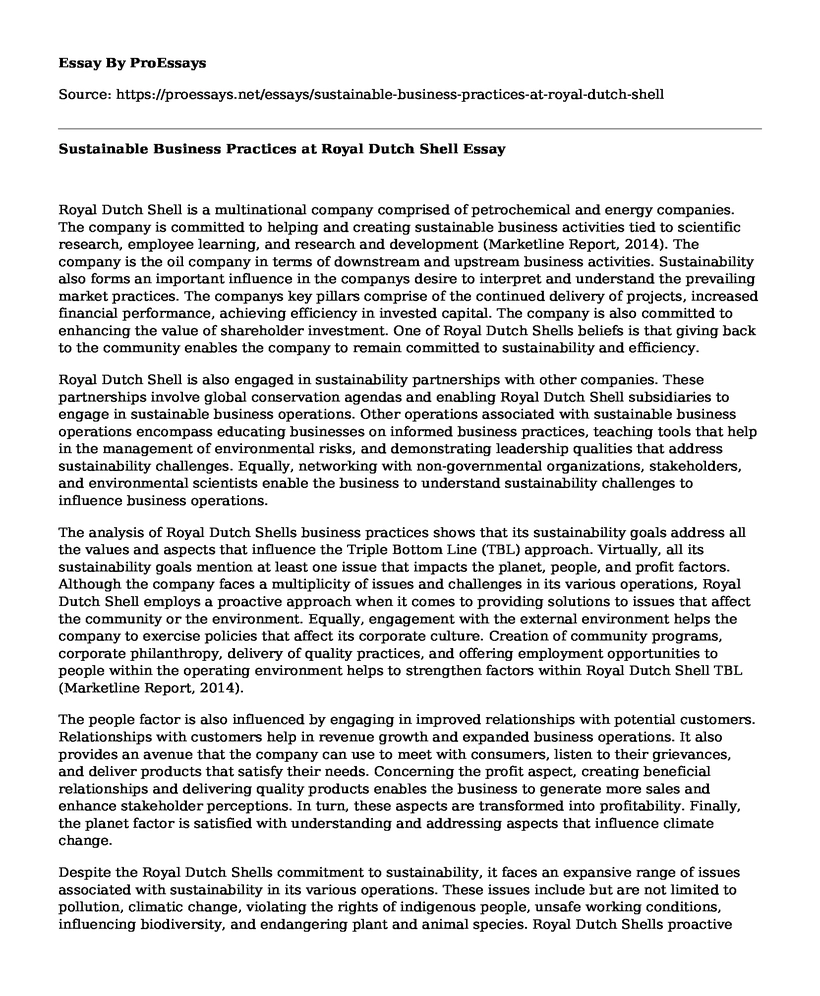Royal Dutch Shell is a multinational company comprised of petrochemical and energy companies. The company is committed to helping and creating sustainable business activities tied to scientific research, employee learning, and research and development (Marketline Report, 2014). The company is the oil company in terms of downstream and upstream business activities. Sustainability also forms an important influence in the companys desire to interpret and understand the prevailing market practices. The companys key pillars comprise of the continued delivery of projects, increased financial performance, achieving efficiency in invested capital. The company is also committed to enhancing the value of shareholder investment. One of Royal Dutch Shells beliefs is that giving back to the community enables the company to remain committed to sustainability and efficiency.
Royal Dutch Shell is also engaged in sustainability partnerships with other companies. These partnerships involve global conservation agendas and enabling Royal Dutch Shell subsidiaries to engage in sustainable business operations. Other operations associated with sustainable business operations encompass educating businesses on informed business practices, teaching tools that help in the management of environmental risks, and demonstrating leadership qualities that address sustainability challenges. Equally, networking with non-governmental organizations, stakeholders, and environmental scientists enable the business to understand sustainability challenges to influence business operations.
The analysis of Royal Dutch Shells business practices shows that its sustainability goals address all the values and aspects that influence the Triple Bottom Line (TBL) approach. Virtually, all its sustainability goals mention at least one issue that impacts the planet, people, and profit factors. Although the company faces a multiplicity of issues and challenges in its various operations, Royal Dutch Shell employs a proactive approach when it comes to providing solutions to issues that affect the community or the environment. Equally, engagement with the external environment helps the company to exercise policies that affect its corporate culture. Creation of community programs, corporate philanthropy, delivery of quality practices, and offering employment opportunities to people within the operating environment helps to strengthen factors within Royal Dutch Shell TBL (Marketline Report, 2014).
The people factor is also influenced by engaging in improved relationships with potential customers. Relationships with customers help in revenue growth and expanded business operations. It also provides an avenue that the company can use to meet with consumers, listen to their grievances, and deliver products that satisfy their needs. Concerning the profit aspect, creating beneficial relationships and delivering quality products enables the business to generate more sales and enhance stakeholder perceptions. In turn, these aspects are transformed into profitability. Finally, the planet factor is satisfied with understanding and addressing aspects that influence climate change.
Despite the Royal Dutch Shells commitment to sustainability, it faces an expansive range of issues associated with sustainability in its various operations. These issues include but are not limited to pollution, climatic change, violating the rights of indigenous people, unsafe working conditions, influencing biodiversity, and endangering plant and animal species. Royal Dutch Shells proactive approach in investigating these issues and challenges makes to believe that the company is engaged in honest reporting of its business activities. However, it would be naive to think that any company would be willing to forsake its measurable profitable interests in favor of providing service to the beautiful world and its occupants. In many instances, sustainability is often as aspect of PR and fulfilling corporate sustainability aspects. Sustainability is always a case that satisfies business obligations. Engaging in activities that pollute the environment and funding efforts aimed at protecting the environment seems to satisfy the goal of fulfilling self-interests. Truth be told, making huge steps in sustainability efforts would mean that a business would make less business sense. There is no doubt that the company operates in a complex environment that is rife with tensions and different points of view on matters relating to the environment. However, the companys sustainability frameworks and beliefs have been tested through various practices and its sustainability vision is created to reflect these practices.
Reference List
Marketline Report (2014). Company Profile: Royal Dutch Shell. Marketline Company Profile Authority
Cite this page
Sustainable Business Practices at Royal Dutch Shell. (2021, Mar 01). Retrieved from https://proessays.net/essays/sustainable-business-practices-at-royal-dutch-shell
If you are the original author of this essay and no longer wish to have it published on the ProEssays website, please click below to request its removal:
- Formation of Business Entities Essay
- Incident in the Lounge Essay Sample
- Essay on Codes of Conduct: Internal Guidelines and External Statements of Values
- Essay Example on Foodservice Management: Job Opportunities in Higher Ed
- Essay on Unethical Behaviors in Organizations: Impact & Prevention
- Essay Example on John Dawson: An Urgent Call for Change at AGC
- Essay Example on Expert Eddy's Business: Legal Form of Ownership







